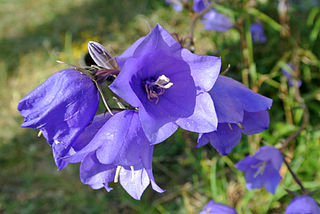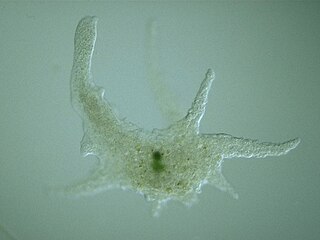Pentagonia is a series of five novels by Cuban author Reinaldo Arenas
The Pentagonia is the collective title of a series of five novels by Cuban author Reinaldo Arenas. It was subtitled by its author "the secret history of Cuba." The novels were written from the mid-1960s through the late 1980s, and indeed, as was recounted in Arenas' autobiography Before Night Falls, were rewritten many times as manuscripts were lost, destroyed and/or confiscated by Cuban authorities. Each of the novels is semi-autobiographical and indeed has Arenas as one, if not more than one, of the major characters.
Pentagonia may also refer to:
- Pentagonia (amoeba), a genus of amoeba in the order Arcellinida
- Pentagonia (brachiopod), a genus of brachiopods in the family Meristellidae
- Pentagonia (plant), a genus of plants in the family Rubiaceae

Arcellinid testate amoebae or Arcellinida, Arcellacean or lobose testate amoebae are single-celled protists partially enclosed in a simple test (shell).

Brachiopods, phylum Brachiopoda, are a group of lophotrochozoan animals that have hard "valves" (shells) on the upper and lower surfaces, unlike the left and right arrangement in bivalve molluscs. Brachiopod valves are hinged at the rear end, while the front can be opened for feeding or closed for protection. Two major groups are recognized, articulate and inarticulate. The word "articulate" is used to describe the tooth-and-groove features of the valve-hinge which is present in the articulate group, and absent from the inarticulate group. This is the leading diagnostic feature (fossilizable), by which the two main groups can be readily distinguished. Articulate brachiopods have toothed hinges and simple opening and closing muscles, while inarticulate brachiopods have untoothed hinges and a more complex system of muscles used to keep the two valves aligned. In a typical brachiopod a stalk-like pedicle projects from an opening in one of the valves near the hinges, known as the pedicle valve, keeping the animal anchored to the seabed but clear of silt that would obstruct the opening.

Pentagonia is a genus of about 34 species of plants in the Rubiaceae family. Pentagonia species are native to Central America and northern South America, and grow in moist tropical forests below 900m.
| This disambiguation page lists articles associated with the title Pentagonia. If an internal link led you here, you may wish to change the link to point directly to the intended article. |









